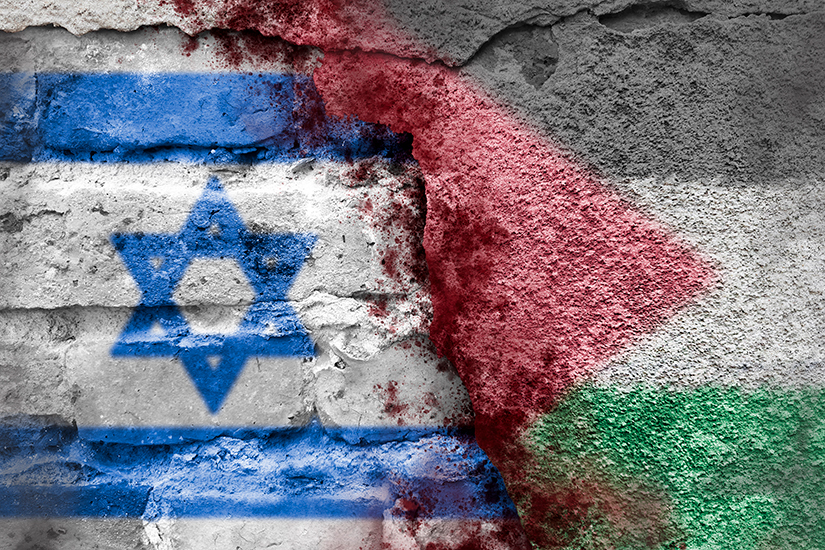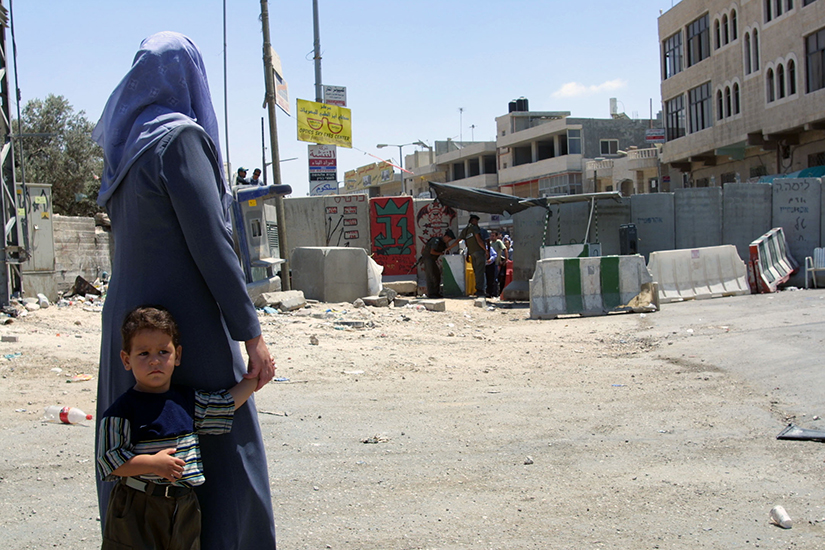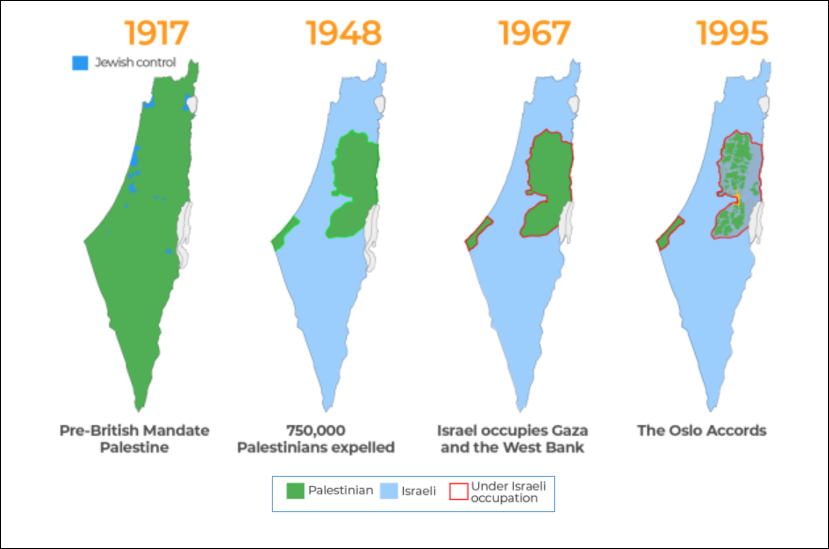As of November 27, over 15,000 Palestinians and 1,200 Israelis have been killed in the Palestinian Gaza Strip and Israel due to Hamas’ surprise attack on Israel on October 7 and subsequent counterattacks by Israel[1]. This conflict is so unusual and serious[2] that not only will there be no winner, but it has the potential to divide the world. Why is this battle unusual and serious, and why has this situation arisen? In this article, I will examine the current situation and its background, touching upon the reactions of Middle East countries, as well as discuss measures for resolution.

An Unusual and Serious Conflict
The current fighting between Hamas and Israel, which began with an attack by Hamas on October 7, is beyond what can be described as ordinary.
First, a large-scale attack was carried out in a short period, causing excessive damage. In the first six days, the Israeli military dropped 6,000 bombs, more than the U.S.-led coalition dropped in any month of fighting against the Islamic State (IS)[3]. In less than a month, more than 10,000 people died in Gaza and Israel combined. As mentioned at the beginning, over 15,000 Palestinians have been killed, more than 36,000 others injured[4], and an estimated 1.5 million displaced. In terms of medical infrastructure, 40% of hospitals and 71% of clinics are closed[5]. More than 280,000 people have lost their homes in Gaza[6]. Philippe Lazarini, Executive Director of UN Relief and Works Agency for Palestinian Refugees (UNRWA), has claimed that around 70% of the dead in Gaza are women and children, and that they are not just “collateral damage”[7]. UN Secretary-General Antonio Guterres expressed his strong concern over the outbreak of a humanitarian crisis in Gaza, calling it an "unprecedented avalanche of human suffering”[8].
Second, while the international community is highly concerned, Israel is conducting intensive fire on public facilities and homes in Gaza without hesitating over civilian victims[9], and the United States, the European Union and other countries initially expressed their unconditional support for Israel[10]. In these circumstances, Israeli settlers have been committing violence against Palestinians and setting fire to houses, but in many cases these criminal acts have been tacitly tolerated and have not been stopped or curbed.
Third, the fighting between Hamas and Israel has destabilized not only Gaza and Israel, but also the surrounding region and the international community at large[11]. The conflict that initially erupted between Israel and Gaza Strip has spread to the Palestinian West Bank, where Israeli forces have carried out attacks on Palestinians, resulting in deaths and injuries[12]. Hezbollah in Lebanon[13] and the Houthis in Yemen have announced counterattacks against Israel, and the fighting may spread to other areas[14]. In the Middle East and Africa, demonstrations against Israel have erupted in many places[15]. In the U.S. and U.K., in addition to protests against Israel, persecution against Jews has occurred, leading to school closures at some U.S. universities[16].
The clashes between Hamas and Israel have already caused irreparable human and material damage in Gaza, but they have also created a decisive division in the relationship between Israel and its neighbors, as well as between the West and the rest of the world[17]. Unless the situation is quickly brought under control, this incident could have serious repercussions for the world.

Background to the current fighting
It is believed that behind the Hamas attack was a sense of crisis that Palestine would be left behind as “de-escalation” progressed between Israel and major Middle East countries[18]. Traditionally, the issue of Israeli settlement in Palestine was an issue for the entire Middle East, with Middle Eastern countries jointly supporting the Palestinian position and opposing Israeli settlement. However, with the Abraham Accords, more countries are recognizing Israel, and with the improvement of relations between major Middle Eastern countries and Israel, Middle Eastern countries have begun to lose their interest in the Palestinian issue.
Under such circumstances, Jewish settlement has progressed in the West Bank, and Israeli settlements in Palestine have expanded in a manner that far exceeds international agreements, and personal movement has been restricted by the separation wall constructed by Israel[19] (see figure below). Palestinian homes and land are unilaterally destroyed and confiscated by Israel, Palestinians who protest are detained, and even children are shot dead. In 2022, 44 Palestinian children were killed, and in 2023 (before the Hamas attack on October 7), 96 children were killed in confrontations with Israeli forces and settlers[20]. In addition, Israeli settlers have caused harassment and violence, such as breaking the windows of houses, but the authorities have tolerated these acts without any crack down. In June 2023, 310 cases of Israeli settlers setting fire to Palestinian homes, mosques, and schools were recorded in just one week[21]. Gaza has been under Israeli siege for 16 years, restricting the free movement of people and goods, with 65% of the population living below the poverty line, 63% suffering from food insecurity, and Gaza's economy in a state of "near-collapse"[22].
Although Hamas has taken the political leadership in Gaza, it has been unable to provide adequate services to the Gazan people under these oppressive conditions, and Gazans have increasingly become dissatisfied with Hamas[23]. Both moderate methods of protest against Israeli settlements and violence went unheeded, and life for the people of Gaza has become increasingly unbearable. At the same time, Middle Eastern countries were losing interest in the Palestinian issue. Gaza has long been described as a "prison without a ceiling," and the people are literally under extreme pressure both physically and mentally. Feeling that there was no way out of the situation if it continued without change, Hamas may believe that there are no options other than to act aggressively[24].
Figure: Changes in areas controlled by Palestine and Israel

Israel's domestic situation
The political situation in Israel since the Hamas attack suggests that Prime Minister Benjamin Netanyahu had no option but to take hardline measures. Israelis living near Palestine have long suffered from attacks from across the border, and they have felt that their lives are threatened. There was even a plan to expel the residents of Gaza to Egypt[25].
The October 7 attack by Hamas, which was carried out on the last day of Israel's long holidays, killed 700 people on the Israeli side alone[26] and included brutal acts, such as kidnapping and murder. Criticism of the Netanyahu administration increased for its failure to prevent the attack[27]. Originally, Hamas is said to have been fostered by Israel as a counterbalance to the Palestinian Authority (PA)[28], which leads in the West Bank. However, support for Netanyahu has plummeted[29] due in part to criticism over this policy. At the same time, conservatives who advocate hardline policies toward Palestine are becoming more vocal in Israel, and domestic media coverage is dominated by reports that emphasize the brutality of attacks by Hamas[30]. Netanyahu described the Hamas attacks as an "existential challenge". He is now in an environment where he believed hardline measures are indispensable. Support for this idea by the U.S. and other countries serves as a factor in bolstering his confidence in this idea.
Looking at the developments since October 7, we can see the gap in perceptions between the Palestinian and Israeli sides, with not only the Palestinians, but the Israelis calling the other side’s attack "ethnic cleansing"[31].
Reactions from Middle Eastern Countries
Since the military clashes, demonstrations have taken place in Middle Eastern countries against Israel's inhumane attack on Gaza and Western countries' support for Israel. South American countries, such as Bolivia, Chile and Colombia, have taken actions such as breaking diplomatic relations with Israel and recalling their ambassadors[32]. In the U.S. and the U.K., there have been protests against media, such as spray painting the facilities of the BBC, Britain’s main media outlet, in protest that their coverage is biased in favor of Israel[33]. There has also been increasing cases of slander and defamation against Jews, which forced some universities to suspend classes temporarily to avoid clashes[34].
Of particular interest in this context is the trend of public opinion in Middle Eastern countries. According to a survey by Arab Barometer, many people in the Middle East do not unilaterally condemn Israel's inhumane attacks, nor are they inciting military aggression against Israel. Instead, they criticize Hamas' inhumane attacks targeting civilians as well, and are more likely to favor a ceasefire[35]. Considering that many in Israel consider the stance of Hamas and ordinary Palestinians to be the same, and support armed attacks that cause civilian victims in Gaza, Middle Eastern countries are calmly and accurately assessing the current situation, and seeking a moderate and realistic solution.
In response to this trend in public opinion, the leaders of Middle Eastern governments, who have been working to improve relations with Israel, are now changing to take more balanced positions[36].
A path forward
The clashes between Hamas and Israel are a battle that will force everyone, including Hamas and Israel, as well as the Western countries that support Israel, into the category of "losers", and produce nothing[37]. The human and physical damage in Gaza has already reached an extraordinary level, but even if Israel were to take control of Gaza militarily, it would lose the trust that Israel and the West have built in the surrounding region and the international community as a whole[38]. The magnitude of the loss would be known in later years. We must take immediate action to minimize such damage now.
First, we should urge Israel to stop its military attacks and proceed to a ceasefire. Significant human and material damage has already occurred. Hamas and ordinary Palestinians are not the same, and indiscriminate attacks on ordinary citizens should not be tolerated under any circumstances. In addition, suppression by force breeds hatred, which in turn creates the basis for further armed attacks. It must be understood that changing the status quo by relying on force will cause more harm than good in the long run.
Second, attention should be paid to the Palestinian issue that lies behind the current Hamas attack on Israel, and a fundamental solution should be sought. The Palestinian people have suffered from illegal settlement that goes beyond international agreements, the expropriation of their homes and land, and have been subjected to detention, armed intimidation, and attacks in response to their nonviolent protests. They have suffered from violence and harassment by settlers. They have been left in a situation where they have neither legal means to protect themselves, nor the “rule of law”. Surrounded by walls, the free movement of people and goods is obstructed, the economy is on the verge of stalling, and there is no way out of poverty. Although neighboring countries and the international community have been aware of this situation, they continued to neglect it for a long time. While we should stop using force to change the status quo[39], we should understand that we have been forced into a situation where there is no other way to change the status quo. We should realize a "two-state coexistence"[40] so that both the Israeli and Palestinian peoples can live as human beings. We should also recognize the economic and social conditions of the people of Gaza and the West Bank, and help the Palestinian people to free themselves from political, economic and social threats, such as poverty and unemployment.
Third, we should act to create a space to explore a solution by properly understanding the current situation in Gaza and Israel, as well as its historical background. Acts of exclusion against Jews, Palestinians, and Muslims complicate the process of finding a calm solution. As the Arab Barometer indicates, we should emulate the correct perception of facts and calm judgment in Middle Eastern countries. To this end, the role played by the media and academics familiar with Palestinian-Israeli issues is enormously important.
Finally, I would like to mention the importance of people, not only in the Middle East but also globally, taking an interest in the clashes currently taking place in Gaza and Palestine and raising their voices. Governments in the Middle East have changed their positions on the Gaza issue in response to the voices of their own people. Countries outside the Middle East, including those in South America, have also expressed their own opinions in response to the seriousness of this situation. Such voices will create international public opinion and become a force to change the behavior of each country. At the United Nations, Secretary-General Antonio Guterres was accused by Israel of "misguided views" and was asked to resign[41]. Furthermore, the head of the Office of UN High Commissioner for Human Rights in New York resigned, disappointed by the current situation in Gaza. The UN Security Council is struggling to find an effective solution now that it has become difficult to build a consensus among major powers. However, the UN consists of not only the Security Council but also the General Assembly, where each country can express its views and efforts can be made to build a consensus. The UN's ability to shape public opinion and the normative power of the international community remains effective, and in order to make the most of this ability, it is important for each individual and each country to speak out and find a desirable solution.
The clash between Hamas and Israel has taken a serious turn, but there is still room to move in a better direction. No effort should be spared to achieve this goal.
This paper was originally written based on data available as of November 5, 2023, and updated on November 29, 2023.
The views expressed in this paper are the author's own and not the official views of his organization.
(2023/12/13)
Notes
- 1 Mohammad Majid, “Gaza death toll from Israeli attacks now tops 15,000,” Anadolu Ajansi, November 27, 2023.
- 2 Joe Gill, “Israel – Palestine war: Why liberal Zionists are attacking the western left over Gaza,” Middle East Eye, October 26, 2023.
- 3 Jake Epstein and Lloyd Lee, “Israel dropped more bombs on Gaza in 6 days than the US-led coalition dropped in any month fighting ISIS,” Business Insider, October 14, 2023.
- 4 ibid i
- 5 OCHA, “Lynn Hastings, Deputy Special Coordinator for the Middle east Peace Process and UN Resident and Humanitarian Coordinator for the Occupied Palestinian Territory, Remarks to Member States Briefing on the Situation in the Occupied Palestinian Territory,” Relief Web, November 3, 2023.
- 6 “Why urban warfare in Gaza will be bloodier than in Iraq,” The Economist, October 30, 2023
- 7 “Killing of children in Gaza not “collateral damage:” head of UN Agency for Palestine Refugees,” Xinhua, October 31, 2023.
- 8 “UN Chief says Gaza faces ‘Avalanches of Human Suffering’,” Barrons (AFP), October 27, 2023.
- 9 Mairav Zonszein, “Israel and Palestine’s Existential War,” The American Prospect, November 1, 2023.
- 10 Richard Falk, “The West's refusal to call for a ceasefire is a green light to Israel's ethnic cleansing,” Middle East Eye, October 24, 2023,;
As of November 5, United States and EU change their stance and call “temporary pause,” but they have not demanded “full ceasefire.”
Henry Foy et al, “Israel’s allies shift away from unconditional support,” Financial Times, November 4, 2023. - 11 Mona Yocoubian, “Will the Israel-Hamas War Spiral into a Wider Conflict?” United States Institute of Peace (USIP), October 26, 2023.
- 12 “Fear and anger rise on the West Bank,” The Economist, October 14, 2023.
- 13 Ben Caspit, “After Nasrallah's speech, Israeli military sees diminished Hezbollah threat,” Al-Monitor, November 3, 2023.
- 14 “The Gaza War Reverberates Across the Middle East,” International Crisis Group, November 4, 2023.
- 15 Elham Fakhro, “Gaza: The Case for a ceasefire,” Chatham House, October 27, 2023.
- 16 Rachel Treisman and Elissa Nadworny, “U.S. students are clashing over the Israel-Hamas was. What can colleges do?” NPR, October 14, 2023.
- 17 Taha Ozhan, “The US-Israel alliance against the Palestinians will set the Middle East on fire,” Middle East Eye, October 21, 2023;Koert Debeuf, “Iraq to Gaza via Ukraine - the moral bankruptcy of the West,” Euobserver, October 26, 2023.
- 18 Fatima AbduklKarim and Taylor Luck, “In Gaza, a different view of the Hamas raid on Israel,” The Christian Science Monitor, October 10, 2023.
- 19 Among the Palestinian refugees forced to leave their homes by Israeli settlements, there are some who carry the “house key” as a symbol. This symbolizes their belief that “we will return home someday, although we are forced to leave by Israeli settlement.” Palestinian refugees first emerged in 1946, and more than 70 years have passed. In the meantime, descendants have been born, and a growing number of Palestinian refugees have never seen “their home”.
“Palestine Refugees,” UNRWA. - 20 “Distribution of Palestinian Child Fatalities by Age Group,” Defense for Children International Palestine, November 3, 2023.
- 21 Talmiz Ahmad, “How Israel-Hamas war will "Frontline" change West Asia's political landscape,” Frontline, October 10, 2023.
- 22 Yasmine Salam, “Gaza Strip explained: who controls it and what to know,” NBC News, October 9, 2023.
- 23 Nathan French, “Hamas was unpopular in Gaza before it attacked Israel – surveys showed Gazans cared more about fighting poverty than armed resistance,” The Conversation, October 18, 2023.
- 24 ibid ix
- 25 Yuval Abraham, ”Expel all Palestinians from Gaza, recommends Israeli gov’t ministry,” +972 Magazine, October 30, 2023.
- 26 Bethan McKernan and Peter Beaumont, “Death toll rises to more than 1,100 after surprise Hamas attack on Israel,” The Guardian, October, 8, 2023.
- 27 “Netanyahu Apologies After Blaming Security Chiefs for Failure in Hamas Attack,” Al Jazeera, October 29, 2023.
- 28 Scott Neuman, “What did Hamas aim to gain by its brazen attack on Israel? Here's what to know,” NPR, October 12, 2023.
- 29 Ravi Agrawal, “Ehud Barak on Israel’s Next Steps,” Foreign Policy, November 1, 2023.
- 30 Ibid ix
- 31 Ibid ix
- 32 Rina Bassist, “Chile, Colombia, Jordan recall Israel ambassadors after Bolivia cuts ties,” Al-monitor, November 1, 2023.
- 33 Mat Nashed, “Western coverage of Israel’s war on Gaza – bias or unprofessionalism?” Al Jazeera, October 29, 2023.
- 34 Mohammad Saleh, “Israel - Palestine War: Hundreds of thousands protest in London to demand Gaza ceasefire,” Middle East Eye, October 28, 2023;Jonathan Alter, “Thinking Straight About the Israel – Hamas War,” Old Goats with Jonathan Alter, November 2, 2023.
- 35 Amr Hamzawy, “Pay Attention the Arab Public Response to the Israel-Hamas War,” Carnegie Endowment for International Peace,” November 1, 2023.
- 36 Sinem Cengiz and Betul Dogan Akkas, “Gulf Normalization Under Strain as Israel Pounds Gaza,” Middle East Council on Global Affairs, October 26, 2023.
- 37 Pankaj Mishra, “Russia and China may be only winners of Gaza war,” Bloomberg, October 12, 2023.
- 38 Neil MacFarquhar, “Developing world sees double standard in West's actions in Gaza and Ukraine,” The New York Times, October 23, 2023;Muhittin Ataman, “West's eroding credibility due to unconditional support for Israel,” Daily Sabah, October 18, 2023.
- 39 Peter Beinart, “There is a Jewish Hope for Palestinian Liberation. It Must Survive,” The New York Times, October 14, 2023.
- 40 Poast says that "multilateral coexistence" is necessary, rather than "two-country coexistence." This is important because it emphasizes the need for improved relations and cooperation not only between Israel and Palestine, but also with neighboring countries surrounding both countries.
Paul Poast,” It will take more than two states to end the Israeli-Palestinian Conflict,” World Politics Review, November 4, 2023. - 41 David Gritten, “Israel demands UN chief resign over Hamas attack comments,” BBC, October 25, 2023.

